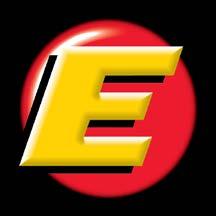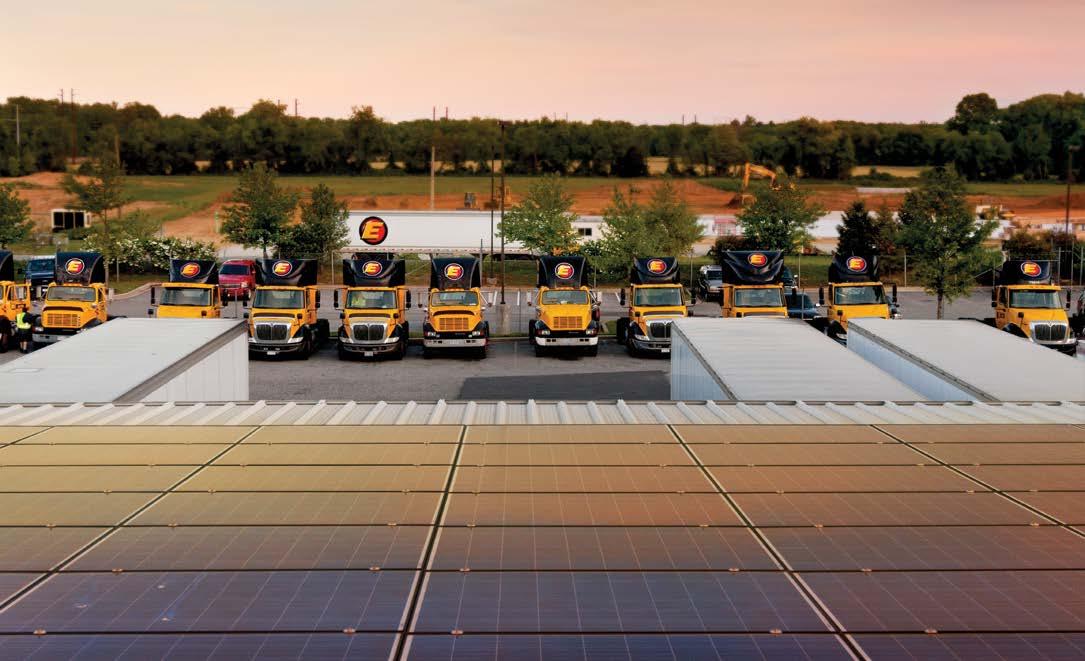




As the nation’s fifth largest LTL carrier, Estes is committed to providing top-of-the-line transportation solutions while still remaining a good steward of the Earth. That’s why we:
» Became the first LTL carrier to participate in Remora’s inaugural carbon capture pilot program
» Were one of the first trucking companies to join the Environmental Protection Agency’s SmartWay Transport Partnership in 2004

» Continue to expand our fleet of alternative fuel vehicles and electric forklifts
» Implement strategies to reduce, reuse, and recycle in our day-to-day logistics
» Invest in solar energy as a nonpolluting, renewable resource
» Reduce emissions by using newer equipment and route optimization technology
At Estes, we’ve got our eyes on the road and the environment. Explore the following pages to discover the many ways we’re investing in tomorrow through our commitment to eco-sustainability.
As today’s trucking companies look for ways to reduce their carbon footprint, many may soon be interested in exploring a groundbreaking new carbon capture technology pioneered by Remora. Remora’s technology helps trucking companies meet their climate commitments by vastly reducing the amount of CO2 their semi-trucks release into the earth’s atmosphere.
Remora is being developed out of research funded by the EPA to:
» Build carbon capture devices that can be retrofitted to the tailpipe of virtually any kind of semi-truck
» Capture up to 80% of the truck’s CO2 emissions
» Permanently sequester the captured carbon by selling it to end-users like concrete producers, who use CO2 in the concrete curing process
Estes is one of only six companies to participate in the inaugural Remora pilot using this groundbreaking new carbon capture technology.
Estes was one of the very first trucking companies to join the SmartWay Transport partnership in 2004. The SmartWay program, pioneered by the Environmental Protection Agency (EPA), encourages greater efficiency and lower greenhouse gas emissions in transportation supply chains. Since its inception, SmartWay has:
» Provided a framework for helping carriers track, document, and share information about fuel use and freight emissions across supply chains
» Given carriers the tools to be able to verify the benefits of fuel-saving vehicles and equipment
» Helped reduce freight transportation-relation emissions by accelerating the use of advanced fuel-saving technologies
Through our continued participation in the EPA’s SmartWay program, Estes is working hard to make freight transportation more sustainable by reducing its negative impact on the environment.
Estes continues to invest in alternative fuel vehicles that run on Renewable Natural Gas (RNG). RNG is a pipeline-quality gas derived from the decomposition of organic matter, such as food, plant, and animal waste (methane). Because Renewable Natural Gas is one of the cleanest burning fuels available today, RNG vehicles:
» Produce less climate-harming greenhouse gases than diesel-powered vehicles
» Reduce emissions of carbon dioxide, carbon monoxide, and carcinogenic particulates
» Don’t introduce brand new carbon emissions into the atmosphere
RNG qualifies as an advanced biofuel under the Renewable Fuel Standard, a federal program that requires all U.S. transportation fuel to contain a minimum volume of renewable fuels. When made from food waste or animal manure, RNG also has the added benefit of being net-carbon-negative.
In addition to expanding our fleet of RNG trucks, Estes is also growing its supply of zero emission electric forklifts. These forklifts run on electric motors, so they:
» Produce no exhaust (unlike those that run on diesel, gasoline, or liquid propane)
» Emit no harmful fumes for terminal workers to breathe
» Release no greenhouse gas into the earth’s atmosphere
Electric forklifts only consume the energy that’s needed for operation, and most electric forklift batteries can be recycled, which further helps the planet.
Learn more about what we’re doing to minimize fuel consumption and carbon dioxide emissions.
At Estes, we implement strategies to reduce, reuse, and recycle in our day-to-day logistics. We are committed to conserving natural resources in our shops, terminals, and trucks by:
» Recycling metal and water
» Using biodegradable, paper-based clean-up sheets instead of traditional shop cloths
» Repairing units with refurbished parts and components when possible
» Using long-life LED lighting
» Repurposing materials such as cardboard and pallets
» Recapping tires
» Conserving paper through paperless e-commerce solutions
We also work hard to keep harmful pollutants out of the air and groundwater by using:
» Nonhazardous cleaning solutions
» Wash systems with oil-water separators that minimize discharge to sewer systems
» Refrigerant capture systems to ensure that Freon and other harmful refrigerants are disposed of in an environmentally-friendly manner
» Self-contained sinks for washing vehicle parts
» Battery storage racks designed to collect acids and other harmful chemicals

» Mounted wheels that eliminate standing water, which can be a dangerous breeding site for mosquitoes who carry disease-causing viruses
Learn more about the procedures we follow to protect the communities we serve from harmful pollutants.
Estes invests in solar energy as a nonpolluting, renewable resource that delivers reliable power year-round. We have installed solar-power systems in our Baltimore, MD; Elkton, MD; Greensboro, NC; and West Middlesex, PA, terminals.
» Greensboro’s system includes 2,760 solar panels that generate about 1,000 megawatt-hours of electricity each year
» Baltimore’s system generates about 320 megawatt-hours from its 1,100 rooftop panels
» Elkton’s 1,232 panels and the West Middlesex installation of 2,150 panels generate more than 777 megawatt-hours annually
Learn more about our solar power systems’ combined environmental impact and annual CO2 emissions.
Less time on the road means less fuel consumption, and reduced greenhouse gas emissions. That’s why Estes:
» Replaces older, less efficient tractors with EPA-certified models
» Invests in route optimization software that organizes all our scheduled delivery stops into the shortest, most efficient trip possible
» Manages driver performance through PeopleNet Fleet Manager software to ensure the best fuel economy
At Estes, we’re committed to investing in green initiatives that are shaping the future of freight transportation. To learn more, visit our Environmental Policies page.
2020 Estes partners with Clean Energy to expand its Natural Gas fleet
2020 Heavy Duty Trucking names Estes in its Top 20 Green Fleets
2021 Inbound Logistics Names Estes a Top 75 Green Supply Chain Partner
2022 Estes wins $200,000 grant from the Massachusetts Department of Environmental Protection to purchase more low-emission vehicles